
British postcard in the Picturegoer Series, London, no. W 950. Photo: R.K.O. Radio.
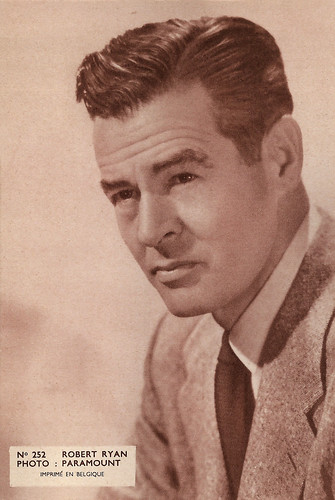
Belgian card, no. 252. Photo: Paramount.
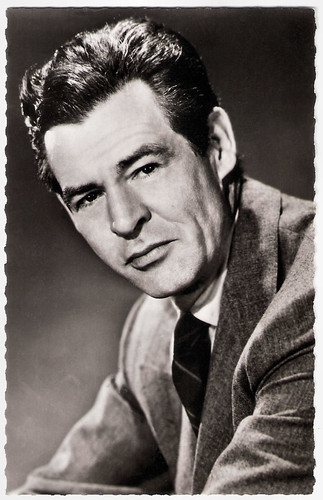
French postcard by Editions P.I., Paris, offered by Les Carbones Korès "Carboplane", no. 873. Photo: Paramount Pictures Inc.
Anti-semitic bully and murderer
Robert Bushnell Ryan was born in Chicago, Illinois, in 1909. He was the first child of Mabel Arbutus (née Bushnell), a secretary, and Timothy Aloysius Ryan, who was from a wealthy family who owned a real estate firm. Ryan's first successes came at Dartmouth College, where he held the school's heavyweight boxing title for all four years of his attendance, along with lettering in football and track.
After graduating in 1932, he worked in various odd jobs: as a stoker on a ship that travelled to Africa and as a roustabout on a ranch in Montana. He returned home in 1936 when his father died, and after a brief stint modelling clothes for a department store, he decided to become an actor. In 1937 Ryan joined a little theatre group in Chicago. The following year he enrolled in the Max Reinhardt Workshop in Hollywood.
His role in the 1939 play 'Too Many Husbands' brought an offer from Paramount. Although he had done a screen test for them in 1938 and been turned down as "not the right type", the studio offered him a $ 75-a-week contract. He made his debut as a boxer in Golden Gloves (Edward Dmytryk, 1940). Throughout the 1940s, he appeared on stage or in supporting roles in films on several occasions. In 1943, he signed a contract with RKO and was fourth-billed in Behind the Rising Sun (Edward Dmytryk, 1943), which was a huge box-office success. RKO promoted him to star status in Tender Comrade (Edward Dmytryk, 1943), where he was Ginger Rogers' leading man. It was another big hit.
In 1944, he joined the United States Marine Corps and was active as a drill instructor at Camp Pendleton, in Southern California. There, he befriended writer/director Richard Brooks. After his discharge from the Marine Corps, RKO immediately cast Ryan in the Randolph Scott Western, Trail Street (Ray Enright, 1947), which was very popular. However, his next film, The Woman on the Beach (Jean Renoir, 1947) with Joan Bennett, lost money.
Ryan's big film breakthrough came with his role in Edward Dmytryk's superb Film Noir Crossfire (1947), based on the novel by Richard Brooks. For his portrayal of the anti-Semitic bully and murderer Montgomery, Ryan was nominated for an Oscar in the category of Best Supporting Actor in 1948. Ryan went on to become one of Hollywood's most versatile actors, able to play both the sympathetic leading man and the film villain. Some of Ryan's portrayals also blurred the lines between good and evil, which is probably why he was often cast in Film Noirs. In his personal favourite, The Set-Up (Robert Wise, 1949) he played a washed-up boxer who has to pay dearly for his last success in the ring.

Belgian collectors card by Kwatta, Bois-d'Haine, no C. 211 (in the series C. 197 to C. 228). Photo: Film Enterprise / M.G.M. Robert Ryan in Caught (Max Ophüls, 1949).
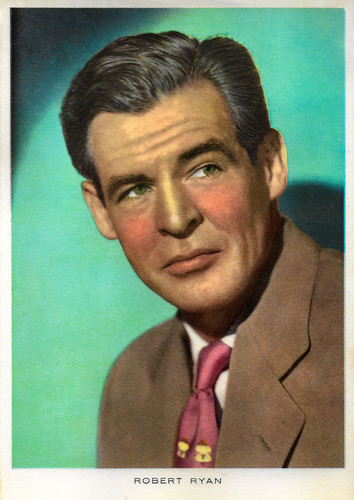
Italian postcard by Nannina, Milano.
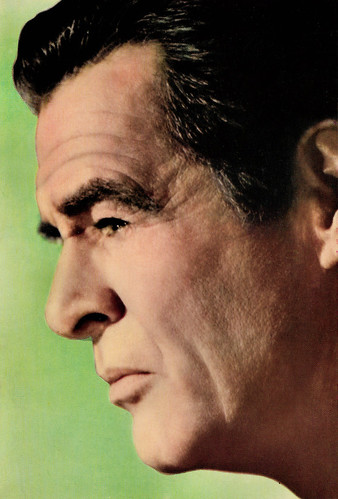
Spanish postcard by Postal Oscar Color S.A., Hospitalet (Barcelona), no. 668.
A hostile and jaded cop
For RKO, Robert Ryan starred in the Film Noir On Dangerous Ground (Nicholas Ray, 1951) in which he played a hostile and jaded cop opposite Gloria Grahame. Ryan went to MGM where he played a villain in Anthony Mann's Western The Naked Spur (1953), starring James Stewart. The picture was very popular.
Other successes were the suspense film Bad Day at Black Rock (John Sturges, 1955) in which he played the head villain opposite intrepid investigator Spencer Tracy and the grimy, gangster film Odds Against Tomorrow (Robert Wise, 1959) starring Harry Belafonte. In the summer of 1960, Ryan starred opposite Katharine Hepburn at the American Shakespeare Theatre in Stratford, Connecticut, playing Antony to Hepburn's Cleopatra.
Ryan remained in high demand throughout the 1960s and was part of some big productions that could count on an all-star cast. For instance, Ryan starred in the biblical epic King of Kings (Nicholas Ray, 1961), the all-star war film The Longest Day (Ken Annakin, Andrew Marton, Bernhard Wicki, Darryl F. Zanuck, 1962), the war adventure The Dirty Dozen (Robert Aldrich, 1967) and the violent Western The Wild Bunch (Sam Peckinpah, 1969).
On the political front, Ryan also made himself heard on several occasions. He was a liberal Democrat and a great defender of civil rights. In the McCarthy era, he joined the short-lived Committee for the First Amendment and protested against the persecution of the Hollywood Ten. Ryan's later political activities included efforts to fight racial discrimination. He served in the cultural division of the Committee to Defend Martin Luther King Jr., and helped organise the short-lived Artists Help All Blacks, with Bill Cosby, Robert Culp, and Sidney Poitier.
In 1972, Ryan's wife, former actress Jessica Cadwalader died of cancer. The two had been married to each other since 1939. Robert Ryan, a heavy smoker, died of lung cancer a year later at the age of 63. He left behind two sons and a daughter. His final film role was as the terminally-ill political activist Larry Slade in the drama The Iceman Cometh (John Frankenheimer, 1973), based on the play by Eugene O'Neill. For his performance, he was posthumously honoured with several awards including the National Board of Review Award.
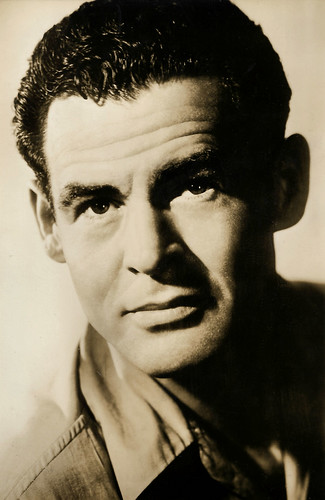
Spanish postcard by Kores Carboplan, no. 252. Photo: Mercurio Films.
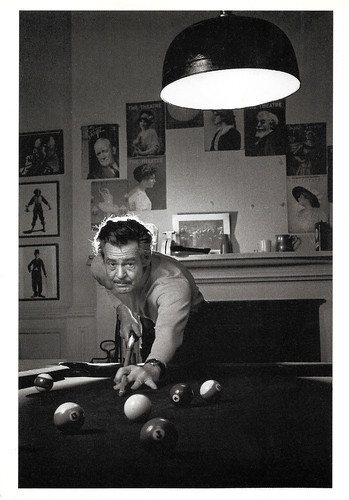
Swiss postcard by News Productions, Baulmes, no. 55047. Photo: Henri Dauman. Caption: Robert Ryan, The Dakota, New York City, 1969.
Sources: Wikipedia (Dutch, German and English) and IMDb.
No comments:
Post a Comment